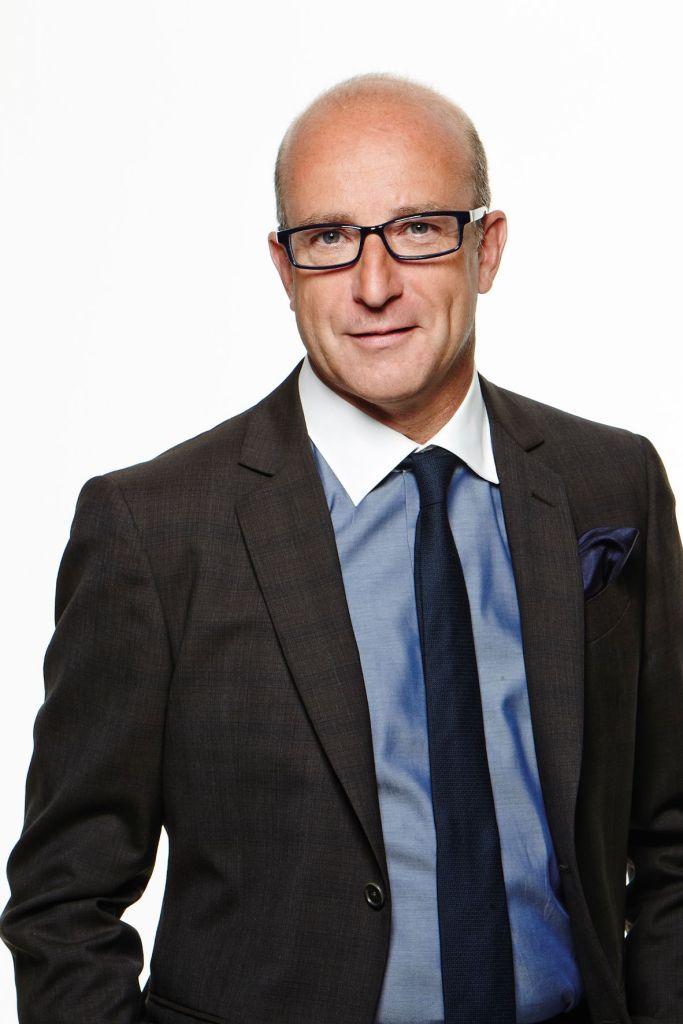The power of positive thinking
We caught up with hypnotherapist Paul McKenna to learn all about the power of positive thinking...

Can you force the hand of your thoughts and train your brain to think differently? Gemma Calvert meets the world-renowned hypnotherapist Paul McKenna, to discover the true power of positive thinking…
It’s no surprise that Paul McKenna, the hypnotherapist and motivational guru, describes himself as an optimistic person, but even he has not emerged unscathed from the world-changing events of the past two years.

‘About 18 months ago, I said to my wife, “I feel a bit down” and she replied, “Been watching the news all day?” and I went “Ah…”,’ says McKenna, nodding his head slowly to illustrate the lightbulb moment that transformed the way he digests news and highlighted the power of positive thinking.
‘If you open a newspaper or turn on the TV, the narrative is that you’re under attack – from the virus, the economy, terrorists, some extremist political party – and, in recent years, the temperature has cranked right up. I now limit the amount of news that I watch. I just take in the headlines and try not to get drawn in.’

Why positive thinking is more important than ever
I’m sitting in McKenna’s airy second-floor sitting room in Kensington, west London, opposite the man whose legendary powers have transformed everyone from mega stars to PTSD-stricken war veterans, not to mention the millions of Joe Publics who have devoured his library of self-help books, which over 23 years have revealed how to achieve – to name a few – happiness, weight loss, wealth, calm, confidence and better sleep.
Now the focus is positivity. But far from traditional way we perceive the power of positive thinking where, regardless of the circumstances, people simply hope for the best and tell themselves that everything will be OK, McKenna’s latest book – his twelfth – is centred on research that reveals some people are more happy and resilient than others.
Studies also suggest that those with a resourceful state of mind and body can better deal with challenges and, therefore, have a better quality of life. But brilliantly, thanks to McKenna, the door is now open for us all to rid ourselves of overwhelm through the power of positive thinking.
Learning to control fear
Through a smorgasbord of guided psychological techniques, which he has also recorded on audio download, McKenna says we can all learn how to control fear and build focus, mental strength and motivation in order to survive and thrive. For many, in the midst of a life-controlling pandemic, it’s finally an opportunity to claim back command of our own existence.
‘In these challenging times, these skillsets have never been more necessary,’ explains McKenna. ‘There’s now a biological vaccine [to protect us against the pandemic], which can improve the quality of our lives. I’m trying my best to provide the psychological vaccine.‘
Far too many people are victims of their brains running them, and stop themselves from having enjoyment in life because they’re continually preparing for emergencies that never happen – but you can force the hand of your thinking, stop yourself from thinking certain thoughts and train your brain to think differently.’
Building a more positive mindset
Written in hypnotic language, the book guides readers on a journey of self-discovery and self-care, by building a mindset and physical state where optimism, resilience, confidence and motivation work in unison.
With practice, McKenna says readers can train their minds using the power of positive thinking, to search for solutions and learn to see what they have, as opposed to focusing on what they don’t have.
‘If you continually look for what you don’t have, you’ll be reinforcing that and coming from a place of lack,’ he explains. ‘Going to a new default setting and beginning to look at what you do have is very simple.
‘These are the big boxes you can tick: Do you have your health, mental or physical? Do you have friends that you can connect with? Is there food in the fridge? Do you have a roof over your head? Are you inhaling clean air? Do you have a purpose?
‘If you can tick those big boxes, life’s good. This is a kind of a reset. It’s not about getting used to having less, it’s about seeing how much you already have.’

You have control over your mindset
McKenna believes we all underestimate the control we have over our ability to change our mindset because it’s not a practice we’re familiar with. He notes that as far back as our school years, we were taught what to think, but never armed with an understanding of how to manage our thoughts.
‘We continually make pictures in our heads and the internal dialogue we use affects our mood and our state, and that drives our behaviour and the results we get in the world,’ he says, before recommending the Havening technique for reducing sadness and establishing calm.
What is the Havening technique?
The practice involves repeatedly and reassuringly touching parts of the body – usually the arms – plus using visualisation to reduce the body’s production of stress chemicals. McKenna used the technique a decade ago after his father died when he had an extended period of grief and sadness.
Reducing stress, insists McKenna, is the first piece of the positivity jigsaw puzzle, because only when the ‘bandwidth isn’t taken up with fear’ is it possible to think clearly about building confidence and motivation – skills that contribute to positivity and require deep inward focus.
‘Confidence is important because as soon as you feel self-belief, you’re in an optimum state,’ he says. ‘You could sit at home all day feeling confident, but that’s not going to make any difference. You need to point confidence at something and decide on the direction of your life.’
Finding direction in life
A former broadcaster, McKenna changed track after interviewing a hypnotist. He began studying the treatment and eventually built an estimated £75 million fortune by transforming people’s lives through a series of CDs, books, TV shows and motivational talks.
In 2008, realising he ‘wasn’t loving life any more’, McKenna closed down his UK business and relocated to the United States, where he spent a decade having ‘a magical time’. Eventually though, he realised something was missing.
‘I was a relentless goal-setter, but if all you ever do is try to achieve goals, there’s no end, and you never get to enjoy it. You just move on to the next one. I’m much more of a direction-setter these days,’ says McKenna, who has since found love with his PA of 25 years, Kate Davey, whom he married in Barbados in 2016.

Focus on your core values
Now his focus is on core values – in short, the non-materialistic things he considers most important. ‘Happiness is when we’re living life in tune with our values – it’s the backdrop to our lives, rather than just momentary spikes of pleasure,’ says McKenna, who lists health, love and creativity as his top priorities. ‘For me, being truly rich is living life on your own terms, in accordance with your values.’
A firm believer that we get more of what we focus on in life, McKenna advises against using the word ‘don’t’ in order to free space in the mind to concentrate on exactly what we want to achieve.
‘People will very often tell me “I don’t want to be overweight”, “I don’t want to be nervous when I talk in front of people”, “I don’t want to procrastinate”, and that’s all they’re thinking about. But we get more of what we focus on. That’s the power of positive thinking.
‘Most people spend more time making a list of what they’re going to get in the supermarket than they do planning the next five years of their life,’ says McKenna. ‘A friend of mine, Michael Neill, is a life coach and he says even if you just go and tell a lamppost your plans every day, they’re more likely to happen.’
The positive future technique
To connect with the future you really want to achieve, McKenna recommends implementing the ‘positive future technique’, which involves visualising the future you want and taking mental steps backwards to understand the path necessary to reach the final destination.
‘Go off in your mind a year into the future. Imagine your life is fantastic, that it’s been one of the best years ever. Think about what must have happened with regards your health, your relationships, your career, your finances and your general levels of happiness. Then come back three months and consider what you must have done in order to get there,’ he says.
‘Come back until you get all the way back to now and, at that point, your mind will be able to see the life adjustments you need to make to get you on the road to living life as you want.’
How the pandemic affected our mindsets
During the pandemic, lockdowns and life restrictions have, notes McKenna, made thinking ahead not only tricky but uncomfortable for many. The positive future practice is effective because it negates feelings of overwhelm and allows us to take baby steps towards our dreams and wants. It allows us to truly see the power of positive thinking.
‘When the life goal is too big, it feels insurmountable,’ he says. ‘So you think: “What’s the point?” But any task can be achieved if it’s broken down into small enough chunks.’
McKenna references last year’s YouGov poll that revealed only nine per cent of people want post-pandemic life to return to ‘normal’, which he believes is because most people now appreciate the extra time available to spend with family and to do ‘exercise, reading and meditation’ – calm-creating boxes he has been personally ticking in recent months.

The power of meditation and positive thinking
‘I’ve been doing tonnes of meditation,’ he says, adding that on morning walks with his beloved Great Dane, Misty, he mentally writes a gratitude list of ‘all the things I’m looking forward to’. It’s a practice he describes as ‘one of the simplest and most powerful things you can do to elevate your mood’.
Right on cue, Misty pads into the living room, stretches out on the carpet and closes her eyes, causing McKenna to momentarily glance across and smile. ‘Lots of people tell me they want money and I ask them why. They’ll say because then they’ll feel secure, accomplished or free.
‘But there are plenty of miserable millionaires in the world. They have loads of money, but they don’t have any quality of life because they’re on a treadmill trying to get more and more stuff. When we stop and look at what’s truly important to us, very often we’ll find that it’s not about having more bits of green paper stored in the bank, it’s actually quality of life.’
Positivity: Confidence, Resilience, Motivation by Paul McKenna (Welbeck, £14.99) is out now.
More inspiration: 7 positive affirmations for preventing overwhelm
Words: Gemma Calvert | Images: Shutterstock & Getty Images









